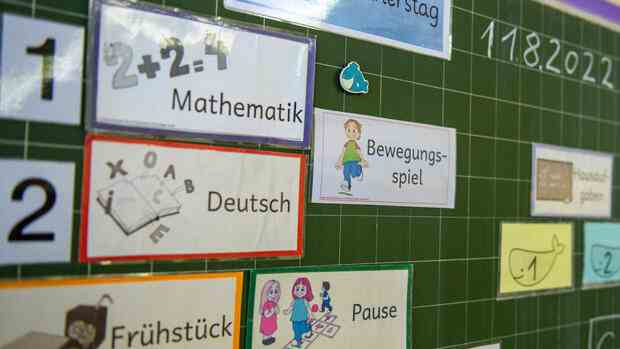Experts call for more instruction in the core subjects German and mathematics.
(Photo: IMAGO/Kirchner Media)
Berlin According to experts, blatant weaknesses in elementary school children contribute to the shortage of skilled workers. The misery in grades one to four means that a fifth of 15-year-olds do not meet the minimum school standards and many young people are therefore hardly able to train.
The Standing Scientific Commission of the Conference of Ministers of Education (SWK) has now developed a program for the general overhaul of the elementary school. The most important results: The number of hours in the core subjects German and mathematics must be increased significantly and weak students better supported.
However, it should be started before enrollment. The daycare center should become a mandatory part of the educational career so that all children are similarly well prepared for the first day of school.
“The basis for everything is the day-care center. We need mandatory language tests at the age of three to four for everyone and mandatory support for everyone who has gaps – even for those who do not attend a daycare center,” says Michael Becker-Mrotzek, who headed the SWK working group.
Top jobs of the day
Find the best jobs now and
be notified by email.
So far, these language tests have not been available for all children everywhere, sometimes they only take place shortly before they start school, as the national education report, which is presented every two years on behalf of the KMK and the Federal Ministry of Education, criticizes.
In general, “a binding implementation of the day-care center’s educational mandate, including in the area of early language and mathematical education” is necessary, says Becker-Mrotzek, who heads the Mercator Institute for Language Promotion and German as a Second Language at the University of Cologne.
The situation in elementary schools is precarious: According to the most recent comparative tests, the negative trend that has been measured for ten years due to the corona crisis has intensified.
One in five fourth graders cannot read, write or do arithmetic properly
“Today, a fifth of primary school children lack the basic skills in reading, writing and arithmetic, almost 40 percent speak little or no German at home,” says Felicitas Thiel, co-chair of the SWK set up in 2021. In addition: “More than a fifth have a risk of mental disorders. The elementary school must adapt better to this in the future,” says the Berlin professor for school pedagogy and development.
>> also read: Negative trend since 2011: Only 58 percent of fourth graders can read well, the basic ability for any learning success
The primary school must invest much more in the support of weak students in order to teach all children what they need for their further school career, the scientists demand. For years, the PISA tests have shown that a good fifth of 15-year-olds do not even meet the minimum standards.
Experts call for 24 weekly hours of German and 20 weekly hours of math in elementary school
In order to secure the necessary basis, “we have to extend the learning time in the core subjects. In four years of elementary school, a total of 24 hours of German and 20 hours of mathematics per week must be taught,” says Becker-Mrotzek. That would be, for example, six hours of German and five hours of maths per week in each school year. Currently, German and maths are mainly taught together with other subjects. “That should be changed.”
In order to improve the system as a whole, however, it is not enough to simply put more money into it, warn the KMK consultants. “The high-risk students often gather in just a few schools. These need far more resources to ensure the necessary support,” says Becker-Mrotzek. In addition, however, social and emotional support must also be binding – sometimes together with social pedagogues. “Because that’s the only way the children can keep up professionally.”
Teachers lack the tools to measure the ability of individual students
In order for the funding to be effective, the experts insist on a comprehensive data-based diagnosis of the abilities of each individual. The goal is clear, the Ministers of Education introduced standards years ago about what the children should learn by which school year. “But the ability of the teachers to diagnose whether this is the case can be improved,” says Thiel cautiously.
“A comprehensive, systematic diagnosis of the knowledge of the students and support based on this is necessary,” says Becker-Mrotzek. Today there is “an unmanageable number of digital tools for diagnosis. We need to separate the wheat from the chaff and give teachers the really effective ones.”
This is not taught enough at universities today, and there is also far too little further training. In addition, there is evidently a mistrust of teachers towards such scientific methods: “In Germany there are fundamental acceptance problems with regard to the use of data for the development of lessons,” states SWK Chair Thiel.
In Switzerland, on the other hand, there is “a tradition that takes a positive view of the diagnosis”. And the Netherlands had already introduced data-based lesson development in primary school in 2007 “and achieved very good results with it”. For this, however, the school management would need “money and time to organize the data-based support”.
More: Shortage of skilled workers: Companies are desperately looking for trainees – at the same time, more and more young people are getting bogged down in unskilled jobs
